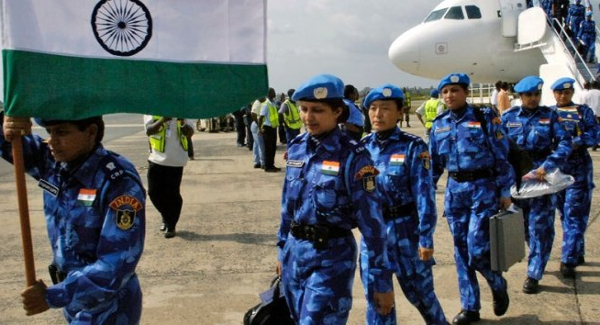An all women Indian contingent from Central Armed Police Forces (CAPF) mandated to the United Nations’ peacekeeping operations will soon be assuming their duties in the war hit Democratic Republic of Congo or MONUSCO. It will be deployed as a rapidly deployable battalion of the Indian Army.
On India sending peacekeepers to Africa, according to Africa expert Prof Ajay Dubey, Jawahar Lal Nehru University, “India is an emerging global power and it has been discharging its global responsibilities in peace keeping and conflict management as one of the largest contributors to peace keeping operations around the world including in Africa.”
“Its initial involvement was in Congo. African countries see Indian peacekeeper presence as one of the most acceptable and non-partisan force,” Dubey opines.
According to Syed Akbaruddin, India’s Permanent Representative to UN Ambassador, at the UN in New York, “India’s Female Engagement Team deployed in UN Peacekeeping is on way to assume duties in Democratic Republic of Congo.”
While this is the first 22-member women UN contingent of the Sashastra Seema Bal (SSB) since its inception 55 years ago, this will be the second CAPF women contingent from India to the UN. The Central Reserve Police Force (CRPF) has been sending its women combatants for similar duties under the UN Flag in Liberia for many years now.
As part of its gender parity and sensitization initiative, the UN has been seeking deployment of a female engagement team (FET) in its missions. The Indian contingent which is soon going to be deployed will be involved in carrying out patrolling and will be engaging with the women and locals in that country under the UN charter. Also, they will be undertaking civic programmes and assisting in conducting investigations and riot control. They have been trained in unarmed combat, weapons handling, tactics, and international laws.
The Democratic Republic of Congo, bordering Uganda, Rwanda and Burundi is the third largest country in the African continent. Due to internal disturbances, it has been placed under the UN.
A recent statement issued by the UN titled “India: A long and deep tradition of contributing to UN peacekeeping” states that India has a long tradition of sending women to UN peacekeeping missions. The first time an all-women contingent was deployed by India to a UN peacekeeping mission was in 2007. Under the UN flag, Indian doctors are providing medical care to the local population in missions around the world, including in Congo.
India is the fourth amongst troop-contributing countries, states the UN and has so far deployed more than 6,700 troops and police to peacekeeping missions. There are currently 15 missions, most of them concentrated in Africa and West Asia for peacekeeping operations.
Earlier this year, at a time when the Chinese military has spread its footprints in Africa through military hardware cooperation, the Indian Army had a joint field training exercise with 17 African nations (AFINDEX-2019) in Pune and were given training in planning & conducting humanitarian mine assistance (HMA) & peacekeeping operations (PKO) under the UN Charter. And is also in line with the government’s policy of enhancing military and defence cooperation with a number of African countries.
Countries including Benin, Botswana, Egypt, Ghana, Mozambique, Mauritius, Namibia, Niger, Nigeria, South Africa, Senegal, Sudan, Tanzania, Uganda, Zimbabwe, and Zambia had participated in the first ever exercise in India.
Source:FE
Image Courtesy:NMTV
You may also like
-
IAF Aircraft Set Course For Exercise Eastern Bridge VII At Oman
-
IAF Set To Host The Indian Defence Aviation Exposition-II At Jodhpur
-
Defence Secretary to co-chair 5th India-Philippines Joint Defence Cooperation Committee meeting in Manila
-
Simultaneous Launch Of ‘malpe And Mulki’, Fourth And Fifth Ships Of Asw Swc (Csl) Project
-
Aatmanirbharta in Defence: MoD signs Contract with HAL for 240 AL-31FP Aero Engines for Su-30MKI Aircraft
